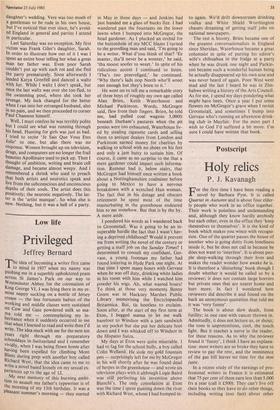Low life
Privileged
Jeffrey Bernard
The idea of becoming a writer first came to mind in 1937 when my nanny was Pushing me in a superbly upholstered pram across St James's Park on our way to Westminster Abbey for the coronation of King George VI. I was lying there in my er- mine nappy sucking on a bottle of Jersey cream — the less fortunate babies of the working and middle classes were sustained on Cow and Gate powdered milk so ma- ma told me — contemplating my in- heritance when it suddenly occurred to me that when I learned to read and write then I'd write. The idea stuck with me for the next ten Years right through my preparatory schooldays in Switzerland and I remember vividly, when I was being flown home after having been expelled for climbing Mont Blanc during prep with another boy called Richard West, that the idea came to me to write a novel based loosely on my sexual ex- periences up to the age of 12. My next memory of this burning ambi- tion to assault my father's typewriter is of the morning of my 13th birthday. It was a pleasant summer's morning — they started
in May in those days — and Jenkins had just handed me a glass of bucks fizz. I had wandered past the fountains on the lower lawns when I bumped into McGregor, the head gardener. As I plucked an orchid for the buttonhole of my MCC blazer I turned to the grovelling man and said, 'I'm going to be a writer. What d'you think of that? 'Ee master, tha'll never be a wreeter,' he said, `tha moost soofer to wreet.' In spite of his ridiculous accent I continued to listen. 'Tha's too preeveliged,' he continued. `Why there's lads oop North who'll wreet reel enough but they's born to it.'
He went on to tell me a remarkable story of three boys of roughly my own age called Alan Brien, Keith Waterhouse and Michael Parkinson. Words, McGregor said, flew from their fingers. Brien, he told me, had pulled coal wagons 3,000ft beneath Durham's pastures when the pit ponies were too exhausted, Waterhouse liv- ed by stealing cigarette cards and selling them to antique dealers from London and Parkinson earned money for charities by walking to school with no shoes on his feet and only a jam butty to sustain him. Of course, it came as no surprise to me that a mere gardener could impart such informa- tion. Rumour had it, below stairs, that McGregor had himself once written a book about a Nottinghamshire coalminer before going to Mexico to have a nervous breakdown with a wretched Hun woman. The fact that in his dotage and obscure retirement he spent most of the time masturbating in the greenhouse endeared him to me somehow. But that is by the by. A mere aside.
I pondered his words as I wandered back to Groomstail. Was it going to be an in- superable hurdle the fact that I wasn't hav- ing a deprived childhood? Would it prevent me from writing the novel of the century or getting a staff job on the Sunday Times? I determined to consult my confidant, Ger- vase, a young footman my father had found loitering in Hyde Park one night. At that time I spent many hours with Gervase when he was off duty, drinking white ladies in his room with him while I watched him powder his wigs. Ah, what wasted hours! To think at those very moments Benny Green was in Hackney Marshes Public Library memorising the Encyclopaedia Britannica. But, tis bootless to exclaim. Soon after, at the start of my first term at Eton, I begged mama to let me walk barefoot to Windsor with a jam sandwich in my pocket but she put her delicate foot down and I was whisked off to Windsor in the Hispano Suiza.
My days at Eton were quite miserable. I had to fag for the school bully, a boy called Colin Welland. He stole my gold fountain pen — surprisingly left for me by McGregor in his will shortly after he was found dead of herpes in the greenhouse — and wrote six television plays with it although Logie Baird was still perfecting his invention above Bianchi's. The only consolation at Eton was the time I spent punting down the river with Richard West, whom I had bumped in-
to again. We'd drift downstream drinking vodka and White Shield Worthington chasers dreaming of getting staff jobs on national newspapers.
The rest is history. Brien became one of the greatest conversationalists in England since Sheridan, Waterhouse became a great columnist in spite of putting his editor's wife's chihuahua in the fridge at a party when he was drunk one night and Parkin- son became such a wonderful human being he actually disappeared up his own arse and was never heard of again. Poor West went mad and the last I heard he was in Zim- babwe writing a history of the Arts Council. As for me, I spend my days pondering what might have been. Once a year I put some flowers on McGregor's grave when I revisit Groomstail, and sometimes I bump into Gervase who's running an afternoon drink- ing club in Mayfair. For the most part I wish to God I'd suffered a bit more. I'm sure I could have written that book.






































 Previous page
Previous page